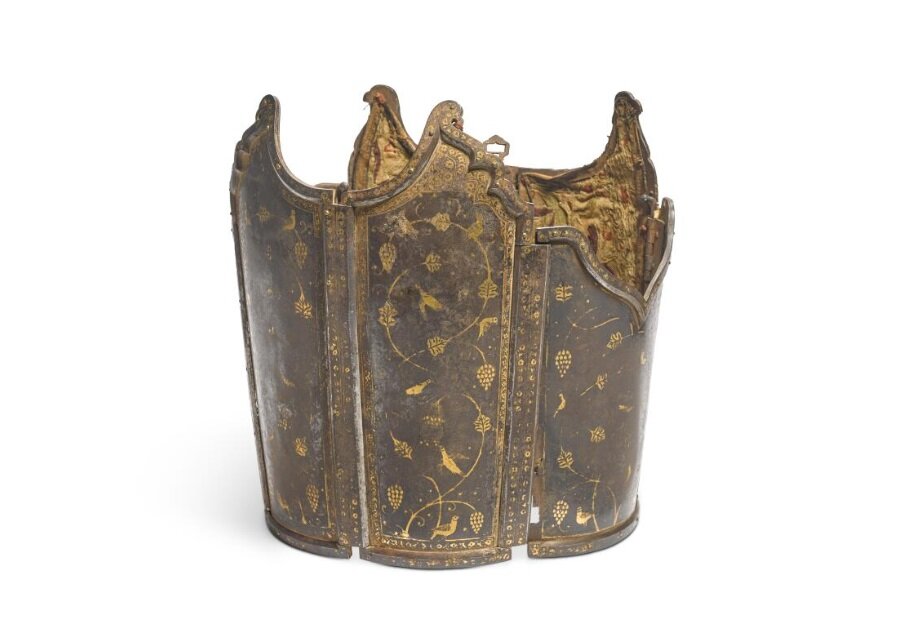Sotheby’s to put collection of Islamic arms and armour on auction

TEHRAN -- Sotheby's, a British-founded American multinational corporation headquartered in New York City, has announced highlights of arts from the Islamic world, which will go under the hammer in its upcoming auction on April 29 in London.
The objects include 100 masterpieces that dates back to 500 years.
The collection has been collected by French collector Philippe Gilles René Missillier (1949-2022) for over 50 years. He visited every museum and attended auctions. He prepared all catalogs and sources.
A high portion of his collection was put on display in Paris in a fair-themed “Splendeur des Armes Orientales” in 1988.
This collection will be put on display on April 29 this year again.
Also, Iranian relics have been presented at this auction. They include a steel axe dating back to the Safavid era and a cuirass of the Qajar era. The axe head has been inlaid.
Some of them are as follows:
A Qajar cuirass, Persia, late 18th or early 19th century
Originally consisting of five steel plates connected by pairs of hinges, the front two plates now missing, each plate made using five sheets of steel, the central sheet of watered steel, attached with rivets and hammer welded, the field of each plate overlaid with gold overlaid spiral grapevine motif including birds, with inscriptions including surah 61 (al-Saff), part of verse 13, in a cartouche at the top of the central plate, and around the borders are selections from surah 48 (al-Fath), starting with verses 1-5 on the central plate, verses 4-7 on the left hand plate, and the end of verse 7-verse 9 and verse 15-17 on the right-hand plate.
A rare Safavid watered steel axe, Persia, second quarter of the 17th century
The watered steel head finely inlaid with rumi arabesques, the cheeks outlined, set on a later wooden haft with ivory pommel cap and modern red cord 60.3cm.
An Aqqoyunlu Turban Helmet from The Saint Irene Arsenal, Eastern Anatolia or Northwest Persia, Late 15th Century
The base of cylindrical form rising to a swollen band of vertical flutes narrowing to a pointed apex, with indents for eyes and eight suspension loops for mail, engraved and silver overlaid with inscriptions in a loose thuluth against a spiral vine ground, with Saint Irene arsenal mark above the right eye, the nose guard plain 33cm.
A rare Ottoman wicker shield (Kalkan), Turkey, 17th century
The wicker body of domed circular form, mounted with heavily corroded metal umbo in center, the wicker wrapped in fine red and yellow silk and silver-thread featuring stylized foliate and geometric motifs and inscribed ‘God’ four times along the border, with ten heavily corroded bosses and corresponding loops to reverse, reverse lined with red velvet 58.5cm.
A four-plate cuirass (Chahar Ayina) from the Warwick Castle Collection, north India, 18th century
Consisting of four convex steel plates, each decorated in the same fashion with a field of neatly arranged chiseled irises surrounded by a gold overlaid border replicating the iris motif, the front and back plate with six clasps, the side plates with four clasps, the reverse of each plate padded and lined with contemporary silver-thread silk embroidered with a repeating pattern of polychrome silk flowers, with Warwick Castle inventory tags.
Sotheby’s has been uniting collectors with world-class works of art since 1744. Sotheby’s became the first international auction house when it expanded from London to New York (1955), the first to conduct sales in Hong Kong (1973), India (1992) and France (2001), and the first international fine art auction house in China (2012). Today, Sotheby’s presents auctions in ten different salesrooms, including New York, London, Hong Kong and Paris, and Sotheby’s Bid Now program allows visitors to view all auctions live online and place bids from anywhere in the world.
KD
Leave a Comment